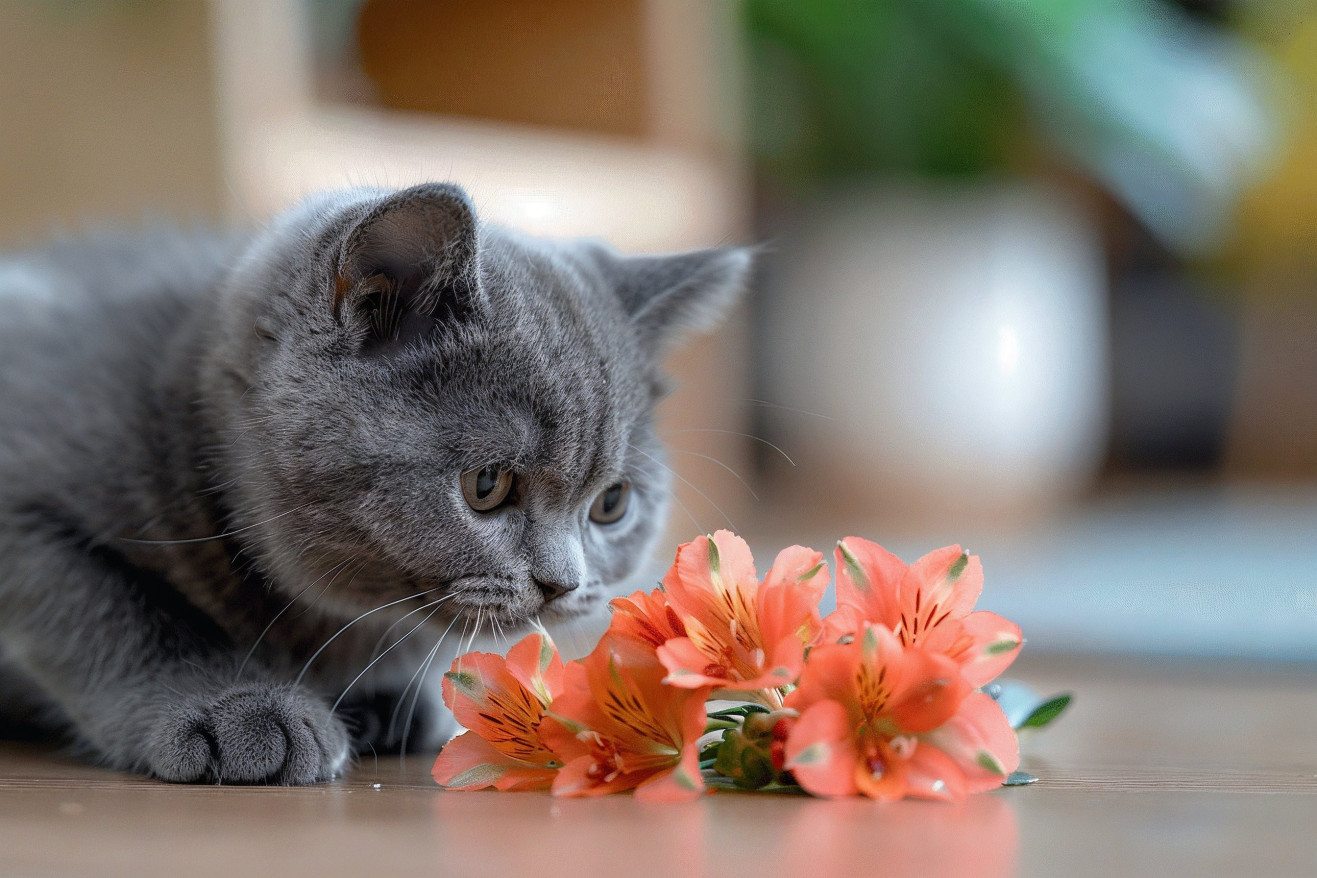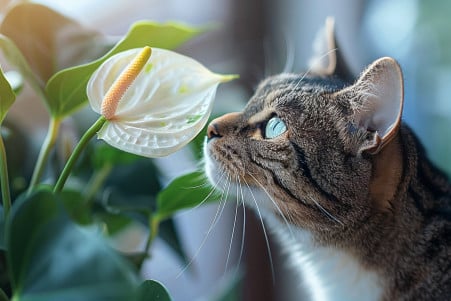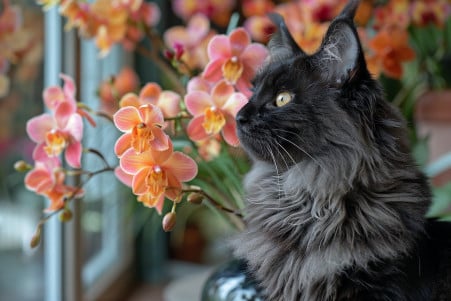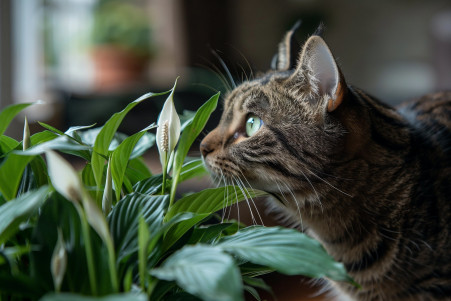Can Cats Eat Alstroemeria? What Pet Owners Should Know
17 April 2024 • Updated 16 April 2024

If you're a pet owner with a cat who loves to chew on your houseplants, you may be asking yourself if the popular alstroemeria is toxic to your furry friend. While alstroemeria is not toxic to cats or dogs, it can still cause gastrointestinal upset, such as vomiting or diarrhea, if eaten in large quantities due to its indigestible nature. That said, it's always best to err on the side of caution and keep your pets away from these flowers.
To help you better understand the potential dangers and impacts of cats eating alstroemeria, we referenced veterinarians, toxicologists, and horticultural experts. By looking at case reports and scientific research, you'll also learn which parts of the plant are most problematic, what symptoms you should look out for, and how you can enjoy these beautiful flowers in a home with cats.
Are Alstroemeria toxic to cats?
Know the Dangers: Alstroemeria Toxicity in Cats
Even though alstroemeria, also known as the Peruvian lily, is not toxic to cats, it can still be dangerous if consumed in large amounts. This is because the plant contains a compound called tulipalin A, which can lead to skin irritation and stomach problems in cats if they eat too much of the plant, according to veterinary experts.
The signs of alstroemeria toxicity in cats are similar to those of lily toxicity and include vomiting, diarrhea, loss of appetite, and mild dermatitis. As noted by the Northern Veterinary Clinic, while these symptoms are generally less severe than those associated with true lily toxicity, it's still important to seek veterinary care if a cat has ingested a large amount of an alstroemeria plant.
The severity of the symptoms will depend on the cat's size, age, and health status. Cats that are smaller, older, or have underlying health issues may be more negatively impacted by eating alstroemeria. It's best to talk to a vet to make sure your cat gets the right care and monitoring based on their individual situation. That said, as long as you're careful and keep a close eye on your cat, you can safely grow these beautiful flowers in your cat-inclusive home or garden.
What to Do If Your Cat Eats an Alstroemeria Plant
If your cat eats any part of an alstroemeria plant, it’s important to act quickly to minimize the potential dangers. According to Poison Control, the first thing you should do is call your veterinarian or the animal poison control for immediate help and information on what to do next. Depending on the situation, your vet may suggest that you induce vomiting, give the cat activated charcoal, or provide other supportive care, such as IV fluids, according to the Northern Veterinary Clinic.
Make sure to watch your cat for any signs of sickness, such as vomiting, diarrhea, or a lack of appetite, and take them to the vet right away if you notice any of these symptoms to help ensure that they recover without any issues, says JustAnswer. While alstroemeria is less toxic than true lilies, it’s still important to treat any potential exposure seriously and follow the advice of animal poison control to make sure that your cat stays safe.
Protecting Cats: How to Avoid Alstroemeria Toxicity
The most effective way to keep cats safe from alstroemeria toxicity is to avoid exposure by keeping the plants away from cats, according to Architectural Digest. This can be done by planting alstroemeria outside or keeping it in enclosed terrariums or hanging baskets inside.
In addition, offering safe, cat-friendly alternatives such as catnip, cat grass, or other non-toxic plants can help meet a cat's natural urge to chew on plants, according to House Beautiful. In general, it's also important to be careful about monitoring cats around any potentially toxic plants and to use deterrents such as citrus sprays or physical barriers to keep cats away from plants.
By taking these measures, cat parents can enjoy the beautiful flowers of alstroemeria without worrying about their cats' safety. With the right precautions, alstroemeria can be part of a cat-friendly environment.
Cat-Proofing Your Home: How to Keep Your Cat Safe From Toxic Plants
The first step in keeping your cat safe from toxic plants like alstroemeria is to identify and remove them from your indoor and outdoor spaces that your cat can access, according to Preventive Vet. For plants you want to keep, The Spruce notes that physical barriers like chicken wire, terrariums, and hanging baskets can be effective ways to keep cats away from your plants.
You can also try natural methods to keep your cat away from your plants. For example, The Spruce explains that cats don’t like citrus smells, so you can spray diluted lemon, lime, or orange juice on the leaves to keep cats away. In addition, World's Best Cat Litter suggests that you can use vinegar to keep cats away from plants by diluting it and applying it around the plants.
In addition to these methods, you can also try to redirect your cat's attention away from toxic plants by offering safe, appealing alternatives like cat grass, catnip, or cat-friendly toys, according to Preventive Vet. By taking these steps to create a cat-friendly environment, you can enjoy the beauty of alstroemeria and other plants without worrying about your cat's safety.
How to Remove and Dispose of Toxic Plants
If you need to get rid of alstroemeria or any other toxic plant, it's important to do so safely to avoid accidental exposure, as pointed out by PetMD. This means wearing gloves and other protective clothing to avoid skin irritation from the sap or other parts of the plant. It also means making sure the plant is bagged or otherwise contained so that it can't be eaten or scattered by pets.
Clairmont Animal Hospital recommends starting with a thorough removal of all toxic plants from a pet's environment, even if the pet hasn't shown any interest in eating them. This includes both indoor potted plants and outdoor landscaping plants.
As for how to dispose of the plants, it's best to check local regulations, as noted by Cats Protection. In some cases, it may be OK to compost the plants, but it's important to make sure the waste is contained and can't be accessed by pets. By following these steps, pet owners can remove any potentially dangerous plants and enjoy alstroemeria's beauty without worrying about their cats.
Conclusion: How to Safely Enjoy Alstroemeria With Cats
Even though alstroemeria is unlikely to be toxic to cats, it can still lead to stomach upset if eaten in large quantities. However, cat owners can still enjoy alstroemeria in their homes and gardens by taking steps to keep their cats safe, such as keeping the plants in areas that are inaccessible to cats, offering safe alternatives, and making sure to supervise their cats.
If a cat does eat alstroemeria, getting them to the vet right away and following their vet's advice for first aid can help ensure the best outcome. With the right information and precautions, alstroemeria can be a safe addition to a cat-friendly home and garden.


